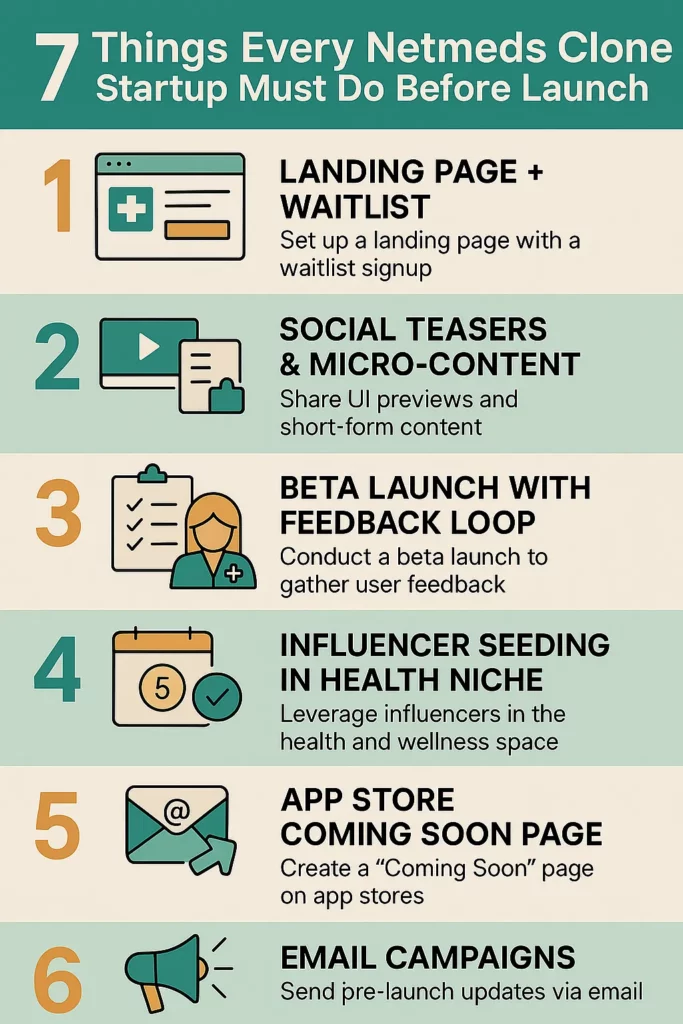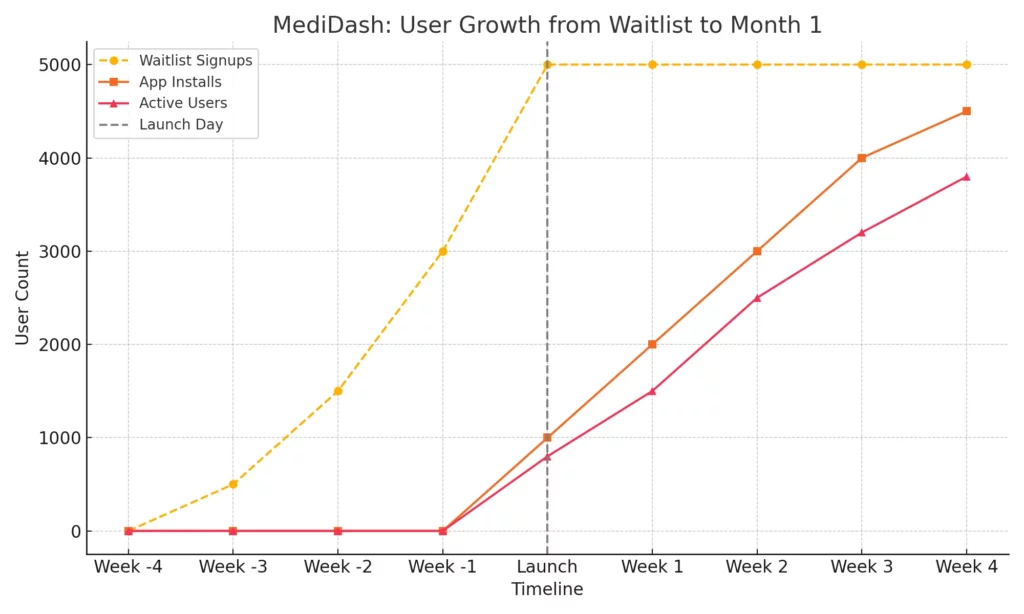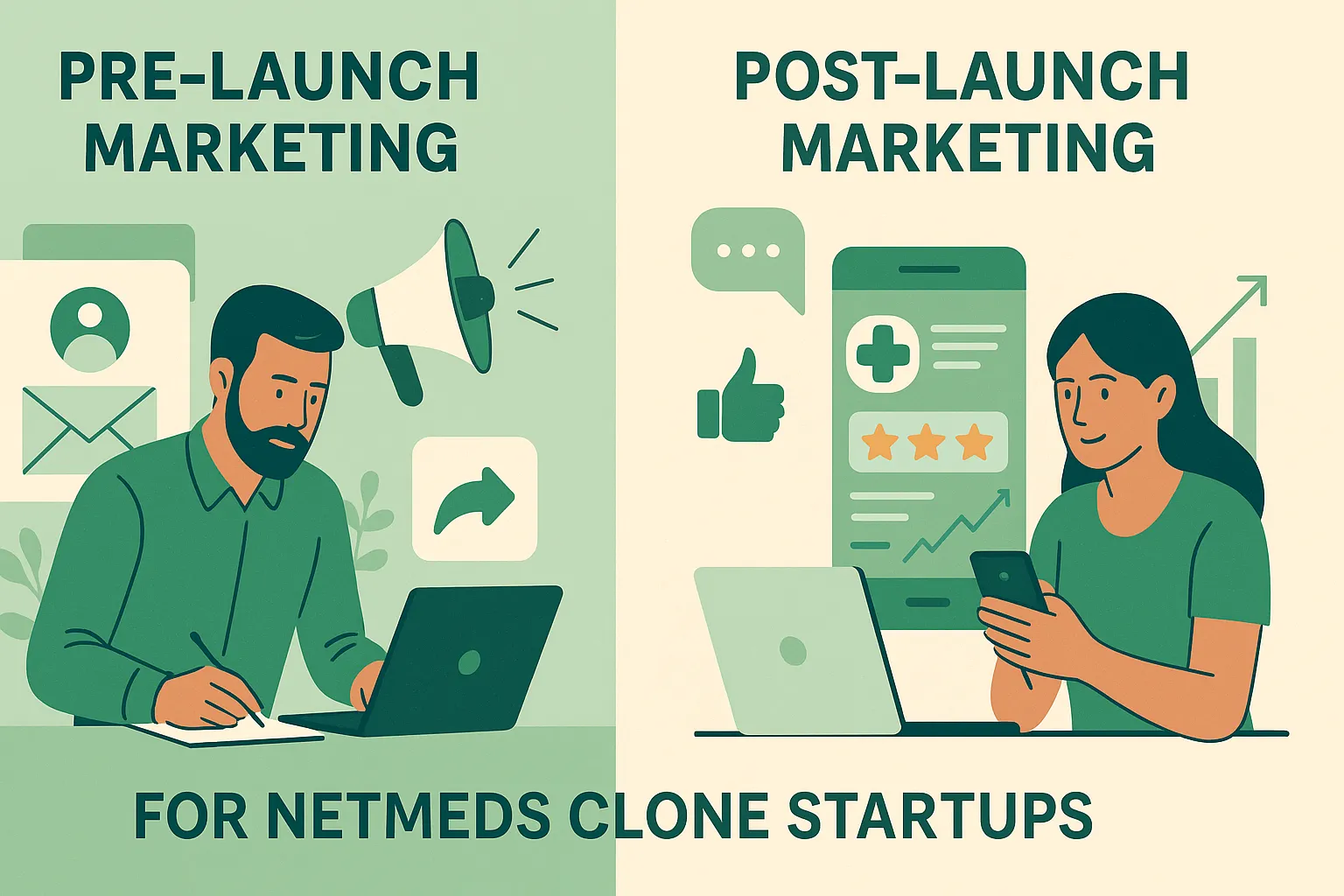Let’s be real—building a Netmeds clone app is no walk in the park. Between code reviews, endless UI tweaks, and fighting bugs that multiply like rabbits, it’s easy to lose sight of what matters most: getting users. And not just any users—engaged ones who reorder medicines, refer friends, and maybe even leave a 5-star review.
But here’s where most startups drop the ball. They treat launch day like some magical finish line. In reality refer Statista. Think that It’s just the starting pistol. If your app drops on the Play Store and no one’s around to download it, did it even launch?
That’s why understanding the difference between pre-launch and post-launch marketing isn’t optional—it’s survival. In this post, we’re unpacking both sides of the launch coin to help you make smarter, bolder moves. And yes, if you’re building with Miracuves, you’re already halfway to victory.
What is Netmeds and How build it?
Netmeds is a leading Indian online pharmacy and healthcare platform that allows users to order prescription medicines, over-the-counter products, wellness items, and other healthcare essentials from the comfort of their homes. Founded in 2015, Netmeds offers nationwide delivery, online doctor consultations, lab test bookings, and a wide range of healthcare services. With a user-friendly website and mobile app, it aims to provide convenient, affordable, and accessible healthcare solutions across India.
Learn More: What Is a Netmeds App? A Beginner-Friendly Breakdown

Pre-launch Marketing for Netmeds Clone Startups
Why Pre-launch is Your App’s Hype Engine
Imagine releasing a movie without a trailer. No posters. No buzz. Just a sudden drop on a random streaming platform. That’s what skipping pre-launch feels like. Whether you’re building a Netmeds clone or the next e-pharmacy unicorn, pre-launch marketing is how you build curiosity, capture leads, and prime your audience.
Pre-launch Checklist:
- Landing Page + Waitlist
Use tools like Carrd, Framer, or Notion to create a simple landing page. Tease your app, offer early access, and grab emails. - Social Teasers & Micro-content
Share UI previews, product philosophy, behind-the-scenes stories. Make it personal, make it punchy. - Beta Launch with Feedback Loop
Invite early testers. Give them a discount. Ask for brutally honest feedback and act on it. - Influencer Seeding in Health Niche
Partner with local doctors, wellness influencers, or health YouTubers for early mentions. - App Store Coming Soon Page
If possible, set up an early access or “coming soon” page with a pre-registration option.
Post-launch Marketing for Netmeds Clone Startups
So You’ve Launched. Now What?
Launch day is like opening the doors to a new pharmacy. The shelves are stocked, the signs are shiny, but if nobody walks in—you’re toast. Post-launch marketing is where growth becomes real. It’s not just about installs; it’s about retention, feedback loops, and making sure your app isn’t just downloaded but used.
Post-launch Moves That Matter:
- App Store Optimization (ASO)
Your app title, screenshots, and descriptions should scream relevance. Include keywords like “online medicine delivery” and “discounted prescriptions”. - Referral Systems
Classic but gold: “Refer a friend and get ₹100 off.” Make sharing easy and rewarding. - Push Notifications (But Don’t Be Annoying)
Send refill reminders, medicine tips, or flash sale alerts—don’t spam. Use personalization. - Retargeting Ads
Someone visited but didn’t convert? Run retargeting ads on Meta and Google Display Network. - Customer Support = User Retention
Fast, empathetic replies turn frustrated users into loyal ones. Use live chat tools like Crisp or Intercom.
Pre-launch vs Post-launch: The Showdown
| Category | Pre-launch Marketing | Post-launch Marketing |
|---|---|---|
| Goal | Awareness, buzz, early signups | Retention, growth, and loyalty |
| Tactics | Landing page, email list, beta testing | Ads, push notifications, app updates |
| Tools | Mailchimp, Typeform, Notion | Firebase, Mixpanel, Google UAC |
| Audience | Early adopters, testers, influencers | Real users, brand advocates |
| KPI Focus | Email signups, shares, waitlist count | Installs, DAU, retention, LTV |
Netmeds’ Business Model
Netmeds operates primarily on a B2C e‑commerce model, selling prescription medicines and over‑the‑counter health products directly to consumers through its website and mobile app, with licensed pharmacists verifying prescriptions before fulfillment. It sources medicines in bulk at wholesale rates and offers customers discounts of around 20–30%, while maintaining margin through markups on wholesale price. Beyond medications, Netmeds expands its offerings to wellness items, medical devices, diagnostics booking, and teleconsultations, generating revenue via service fees, commissions on tests and consultations, and subscription plans that include perks like discounted refills and free shipping.
Additional revenue comes from shipping charges, marketing and advertising partnerships (such as sponsored product listings), and affiliate-driven traffic conversions. Netmeds also explores B2B wholesale, considering supplying pharmacies directly at discount rates, and is expanding via franchise stores to build offline presence across India.
Learn More: Business Model of Netmeds:Strategy & Revenue Insights
Real Example: Meet “MediDash”
Say you launch a Netmeds clone called “MediDash”. During pre-launch, you build a community via Instagram Reels—short health tips that go mildly viral. You capture 5,000 email signups before your app even drops.
On launch week, 2,000 people install the app thanks to your referral promo. You use in-app reminders to push for repeat purchases. Within 30 days, you’re hitting 3x user engagement compared to generic health apps.
Build Your Own Health App Like Netmeds with Miracuves

Conclusion
Marketing your Netmeds clone is a two-act performance. Pre-launch builds anticipation. Post-launch builds momentum. Skip either, and your startup risks becoming a ghost town on the app store.
The good news? Trends like voice-based prescription ordering, AI-powered dosage reminders, and hyperlocal delivery are making healthtech apps more engaging than ever.
At Miracuves, we help innovators launch high-performance app clones that are fast, scalable, and monetization-ready. Ready to turn your idea into reality? Let’s build together.
FAQs
1) What’s more important—pre-launch or post-launch marketing?
Both! Pre-launch gets attention; post-launch keeps it. One without the other is like a car with no engine—or no wheels.
2) How early should I start pre-launch marketing?
Start immediately — since Miracuves delivers your product in just 3–9 days with guaranteed delivery, you can begin testing ideas, building your audience, and gathering feedback right from day one.
3) What are some free tools I can use for pre-launch?
Use Carrd for landing pages, Notion for roadmaps, and Mailchimp for emails. Zero cost, high impact.
4) What if I can’t afford ads post-launch?
Start with organic hacks—referrals, social proof, Reddit threads, and influencer shoutouts in the health niche.
5) Should I launch on iOS and Android together?
Depends on budget. Android has broader reach in India, so many launch there first and expand later.
6) Can Miracuves help with marketing too?
Yes! While we specialize in building clones like Netmeds, we also provide go-to-market guidance and growth playbooks.








